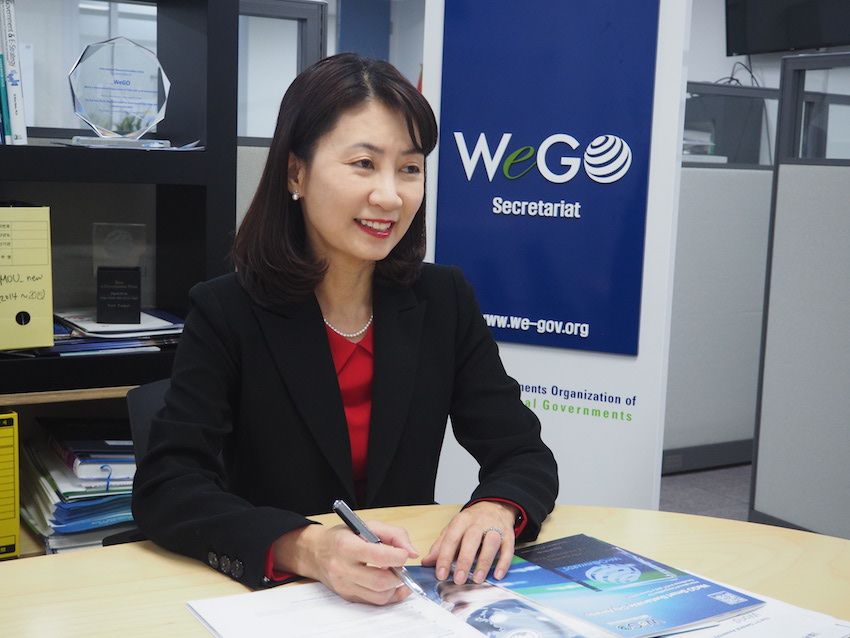Young-sook Nam, Secretary-General of WeGO
By Charlene Chin
Women in GovTech Special Report 2016.

How do you use technology to improve citizens’ lives? Tell us about your role or organisation.
I am serving as the Secretary General of WeGO, the World e-Governments Organization of Cities and Local Governments.
We are an international organisation of 110 cities and 5 national ICT institutions focused on sustainable urban development through e-government, ICT and smart city. Seoul, a global leader in e-Government and smart city, is currently serving as our President City.
WeGO serves as a global platform of capacity building, knowledge sharing, benchmarking, and city-to-city cooperation between our member cities.
In particular, our programmes are aimed at enhancing the ICT capabilities of cities and leveraging their innovation potentials to develop transformative solutions that support broad stakeholder involvement and digital inclusion, integrated decision-making and foresight, open government, as well as wide online service availability and accessibility.
What has been the most exciting thing that you worked on in 2016?
2016 has been WeGO’s most productive year. Not only did we grow from 87 member cities to 115 members, but we had the privilege of working on some very engaging activities with successful outputs.
A standout among them was the conclusion of our Feasibility Study from 2015 and the beginning of a brand new study for 2016.
In 2015, the WeGO Secretariat provided complimentary studies to two cities, San Fernando in the Philippines and Hanoi in Vietnam, with the end goal of implementing a Citizen Participation System (CPS) in each city. At the conclusion of the studies, a successful citizen participation mobile app was launched in both cities.
It was personally fulfilling to be a part of making citizens’ lives better by giving them a clear avenue to report the defects of their city and suggest methods for improving it.
Currently, we are conducting the 2016 WeGO Feasibility Study on smart street and traffic lighting, with a focus on IoT and big data for the city of Seberang Perai in Malaysia.
Through an impartial bidding process, a committee of experts selected a consortium of the best consulting and solutions companies to conduct the study and also to set up a smart street and traffic light pilot system right in front of Seberang Perai’s municipal building.
A mobile app will allow Seberang Perai Municipal Council employees to access the real- time condition of the lights and exercise control over them.
Sensors from the brand new LED lamps will gather data on the pilot server to be used in data analytics for future big data projects.
What tool or technique particularly interests you for 2017?
I’m particularly excited by the idea of open innovation and crowdsourcing to enable sustainable urban development.
I recently participated in a panel session at Smart City Expo World Congress in Barcelona on this theme and was fortunate enough to hear some of the innovative ways my fellow panel members were utilising technology to harness the collective creativity of their own citizens for some great policies in cities like London, Chicago, and Mexico City.
However, the kind of crowdsourcing that I think will really reach the next level in the upcoming years is the collaborative sourcing of knowledge among cities, rather than simply between cities.
To this end, my organisation is building a cross-city open innovation online platform involving municipal governments, academia, citizens and corporations.
This will be a global living lab where knowledge and experiences are shared and is the ideal environment for open innovation on a global scale.
Unlike the private sector where innovators must compete, cities can cooperate and share, and I see this being the real future for smart cities.
If you were to share one piece of advice that you learned in 2016. What would it be?
I have learned that city leaders and officials need to have a more holistic understanding of a smart city. Smart city initiatives have often been characterised as technology-driven or vendor-driven projects, without well-defined objectives.
In order to harness the transformative potential of smart city initiatives, CIOs and city officials should have a well-balanced, holistic view of different aspects of a smart city, including governance, stakeholder engagement and citizen focus, effective use of data, and integrated ICT infrastructure.
WeGO, together with the TM Forum, has recently launched a Smart City Maturity and Benchmark Model reflecting this holistic view, and has incorporated all of these aspects into our capacity building programmes.
And finally, if you could recommend us one place to eat, where would it be?
One place that I cannot recommend enough to anyone who visits Seoul is “Balwoo Gongyang,” a temple cuisine restaurant located walking distance from our WeGO Secretariat office, across from Jogyesa Temple.
It was recently awarded a Michelin Star, and I was thrilled to see them receive some international recognition.
The depth of flavour that they’re able to bring out of all-natural, seasonal ingredients, using traditional techniques makes non-Koreans and even Koreans like myself, re-think the expectations evoked when we hear the words “temple cuisine.”
I should also mention that, keeping with Buddhist temple tradition, it’s entirely vegetarian, which comes as a surprise to some meat lovers I know who hardly even realise it until after they had already finished their meal.
The staff are also fluent in English and Japanese and provide a thorough explanation of each dish as it’s served.